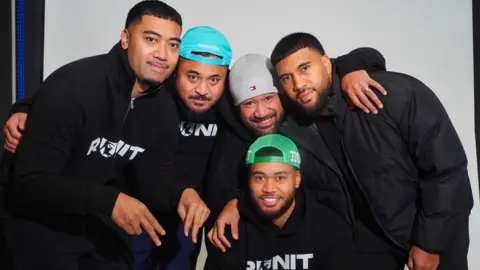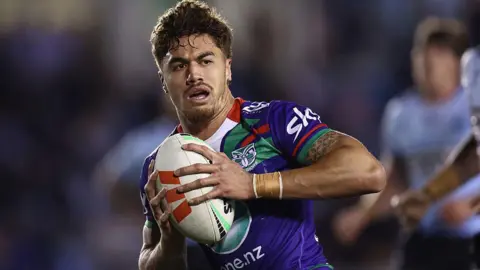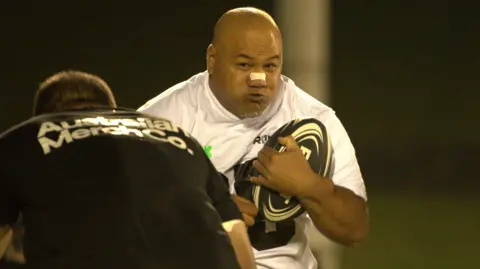The push to show a yard deal with sport into a worldwide sport
BBC Information, Sydney
“Defender prepared?” calls the host.
A thumbs up and moments later, two burly males – with no protecting gear – run full pace at one another earlier than they conflict, the unmistakable sound of flesh and bone crunching.
The group erupts right into a collective roar, some cheering, others wincing.
That is the second they have been ready for – and it is precisely this adrenaline-fuelled vitality that organisers of the Run It Championship League are banking on to assist deliver what they name the “world’s fiercest, new collision sport” to international audiences.
It’s a supercharged model of a one-on-one deal with sport which originated within the backyards and college playgrounds of Australia and New Zealand – particularly in Pacific Islander communities.
One particular person carrying a ball should “run it straight” on the defender, who can also be sprinting in the direction of them: they aren’t allowed to duck, hurdle or sidestep the tackler.
Movies of the sport have just lately gone viral, and the founders of the Run It league have capitalised on the surge of curiosity – they are saying they’ve gained tens of millions of views on-line, gained over 1000’s of followers, attracted huge title sponsors, and even impressed rival competitions.
They’ve held jousts in Melbourne and Auckland, and on Saturday one other will happen in a Dubai enviornment, the winner taking away prize cash of A$200,000 (£98,000). Subsequent on their agenda, is an enlargement to the UK and US.
However the groundswell of assist for the league is more and more being rivalled by important voices. Medical consultants and sporting figures are frightened in regards to the bodily and psychological well being impacts of the sport – which has additionally grow to be a wider social media craze, that’s already accused of claiming one life.
“It is like shaking a child,” says Peter Satterthwaite, whose teenage nephew died after copying the sport at a celebration.
From the schoolyard to the world stage
 Luis Enrique Ascui/THE AGE/SMH
Luis Enrique Ascui/THE AGE/SMHThe target of the sport is easy: be the one who “dominates” the contact, as deemed by a panel of three judges.
Two of the league’s seven co-founders, Brandon Taua’a and Stephen Hancock, inform the BBC they’ve fond reminiscences of taking part in the sport as youngsters in Melbourne.
“I used to ‘run it straight’ at Brandon on a regular basis,” Hancock says, joking that the pair would often attempt to keep away from hitting one another straight on.
There will be none of that this weekend, when the eight finalists compete for that big money prize in United Arab Emirates.
Hancock insists Run It’s a “sport of talent” – “[It’s] all in regards to the footwork” – however there is not any denying the violent nature of it.
A fast scroll of the league’s social media accounts reveals dozens of quick-burst movies, all honing in on the explosive motion of two males colliding.
In different movies circulating from the occasions, a number of opponents are knocked out and require rapid medical consideration.
Taua’a acknowledges the game comes with dangers, however says the league has security protocols to minimise them.
Rivals are screened, present process medical assessments – equivalent to blood exams and a bodily examination – they usually should additionally ship a current video of themselves taking part in a sport that options tackling. Medical workers are additionally on the sidelines of the occasions.
“There’s a component of hazard with browsing, with boxing, and lots of different sports activities as properly,” Taua’a argues.
For Champ Betham – who gained NZ$20,000 earlier this month on the competitors in Auckland and is gunning for the title in Dubai on Saturday – the ingredient of hazard is a secondary consideration.
“This can be a large blessing to a complete heap of us to just about attempt to win 20K or no matter for a pair hours’ work,” he informed Radio New Zealand on the time.
“We obtained to repay some money owed and top off the fridges and the cabinets, meals for our little ones, particularly with the economic system and stuff like that right here in New Zealand. Nothing’s low-cost lately.”
 Getty Photos
Getty PhotosThe cash concerned, for a league which has solely been round for six months, is spectacular. Together with the prize fund, opponents’ journey and lodging bills are being paid. A 1,600-seat enviornment has been booked. The league has a slick social media account, a PR consultant, and a bunch of promoters – together with antipodean sports activities stars.
Its preliminary monetary backers have been described solely as “a gaggle of native buyers who imagine within the product”, however greater names are rising: days earlier than the Dubai occasion, the league introduced it had secured a significant sponsor in on-line playing platform Stake.com, which is banned in key markets like Australia and the UK.
There are additionally ongoing talks with potential US buyers, together with a contact linked to American podcaster and UFC heavyweight Joe Rogan, which Taua’a says “will certainly assist” the league construct a presence within the US.
They may want huge backers to match their ambitions for the competition, which they argue is greater than only a fleeting social media pattern.
“This might truly eventuate right into a sport that would sit [in a class] with MMA and boxing,” Hancock says.
‘An innocuous conflict’
However as Taua’a and Hancock give attention to the competitors’s future ambitions, increasingly more voices are questioning its security.
“They may as properly arrange smoking as a legit sport,” says neuroscientist Alan Pearce.
Chatting with the BBC from the New Zealand metropolis of Palmerston North, Peter Satterthwaite is unequivocal.
“It isn’t a sport,” he says. It is “a harmful exercise” designed purely “to harm the man in entrance of you”.
His 19-year-old nephew Ryan was celebrating a twenty first birthday with buddies at an area park once they determined to attempt the sport they’d seen throughout their social media feeds.
Ryan did two tackles. Neither he or his good friend fell down or clashed heads. However as he walked away, he informed his mates he did not really feel properly, his uncle recounts.
“[Ryan] was coherent for a bit, then he lay down and his eyes simply rolled again in his head.”
 Pete Satterthwaite
Pete SatterthwaiteMates rushed him to hospital the place docs needed to “lower a large chunk out of his cranium” to alleviate stress brought on by mind swelling, Satterthwaite says.
“I noticed him on the ventilator, his chest going up and down as he was respiratory, and it was like ‘Stand up! Open your eyes’.”
On Monday night, only a day after he was taking part in together with his mates, Ryan’s life assist was turned off in a hospital room full of family members.
“It was simply an innocuous conflict,” Ryan’s uncle says, “and it simply reveals you the way fragile life is and the way fragile your mind is.”
Run It says it understands the hazards of contact sports activities and takes security significantly. Weeks after Ryan’s dying, the league posted a video saying the sport is “not for the yard, not for the road”.
“Don’t do this at house,” they stated.
However Satterthwaite doubts that warning could have a lot affect.
“I do not suppose there is a sport on the earth that individuals do not do on the seaside, or of their yard, or on the park.”
It isn’t simply the bodily impacts that fear Shenei Panaia.
 Shenei Panaia
Shenei PanaiaAs a Samoan rising up in Australia, she would typically see schoolkids taking part in the sport as a little bit of enjoyable. However the psychological well being employee fears it reinforces “a model of masculinity the place silence is energy, and violence is proof of pleasure”.
“It sends a harmful message to younger males that their value relies on how a lot ache they’ll take. That when you’re not powerful, you do not belong.”
And the league’s try to show this right into a profitable spectator sport contradicts the values of many within the Pacific Islander group, Penaia says.
“We’re taught to look out for each other… and to make choices that serve extra than simply ourselves.”
‘Blood within the air’
Their considerations are echoed by a pack of concussion consultants and sporting figures.
For greater than a decade, the world of high-impact sports activities has been introducing security measures because the analysis into mind accidents develops.
Official our bodies together with Rugby Australia, New Zealand Rugby have warned individuals not to participate, with the New Zealand Prime Minister additionally weighing in, saying it is a “dumb factor to do”.
 RUNIT
RUNITNeuroscientist Pearce argues Run It magnifies “essentially the most violent elements of our established sport”, whereas the security protocols do little to minimise any danger. Blood exams and bodily exams can’t predict a mind harm, and catastrophic injury can happen even with out a direct hit to the pinnacle, he says.
“I am unable to see how operating at 25km an hour straight at one another with out stopping is secure,” he tells the BBC. “It is so simple as that.”
There’s the chance of rapid concussion, Dr Pearce says, delayed onset mind accidents like Ryan Satterthwaite’s, and continual traumatic encephalopathy (CTE) – a degenerative illness brought on by repetitive head trauma. They’ll result in cognitive impairments, motion issues, dementia, melancholy.
“[They’re] mainly utilizing the collision because the leisure worth, which is, in impact, commercialising concussion,” he concludes.
However a spokesperson for the league – who argues it’s “not about masculinity” however “energy and talent” – say organisers don’t have any intention of slowing down, and are not too frightened about their critics.
Taua’a says what occurs at their competitions is “not an excessive amount of completely different” to what you see on televised rugby matches, and – with their protocols – it’s far safer than lots of the video games performed in backyards the world over.
“It is fairly new for viewers and it would take a while for them to get used to seeing what we have put collectively.”


